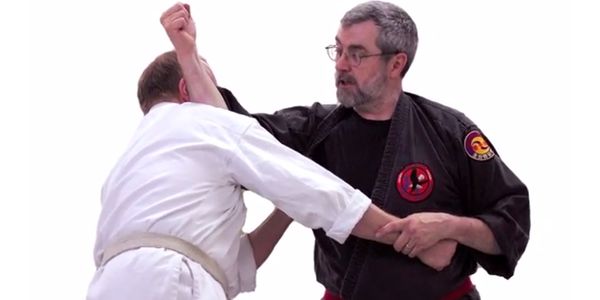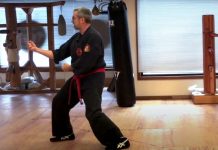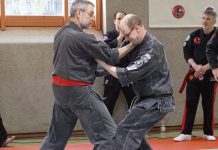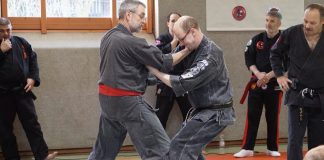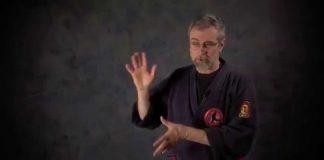Back in 1997, DKI member and physician Chaz Terry helped set up a small investigatory study of pressure point techniques which was conducted at University of Pennsylvania Hospital in Philadelphia. My account was published in Black Belt Magazine (click here to read the article) and as a chapter of Humane Pressure Point Self-Defense. I was present for the sole purpose of recording and writing about the event. So, I did not participate directly in the process. But, I had the best seat in the house.
The room was cold, lit with fluorescents and generally “institutional”. Each subject to be knocked out was wired up with electrodes to monitor such things as brain waves, heart rhythms, blood pressure, and so on. This took 20 minutes. Then the subject would stand on a wrestling mat (a safety precaution) while “pre-strike” data was gathered. Cameras were synced to medical monitoring devices and time was spent waiting for everything to be ready. Then, the person who was performing the strike was told to proceed, but, oh, not too forcefully because we don’t want to dislodge any wires, and be careful not to cause too much movement because that creates artifact, now go ahead and knock him out.
This was an incredibly stressful setting in which to do anything. Those doing the striking were out of their element, anxious, being asked to think about more than just the technique itself. Not surprisingly, many had some difficulty with their techniques. When this would happen, when the simple craziness of the setting got in the way, and someone would fail in performing an effective knock out, George Dillman would say, “Ed, you do it.”
“Ed” is my colleague Ed Lake. And Ed would do it. He would walk up and “bam” the subject would hit the ground.
At one point, Dillman-sensei was speaking to one of those struggling to get the knock out to work. “Do it like Ed!” He said. “But, Ed doesn’t give a sh*t!” came the reply.
This is an important observation. When striking a pressure point, it can be our own anxieties and concerns which keep the technique from working. We hinder our energy from flowing. We worry that we won’t be able to succeed, so we don’t. We worry that our uke (the person who receives our knock out technique) will be injured, so we fail. We strike too hard, or not hard enough, while holding back our intent, our energy, because of all our concerns, all our fears, all our issues of ego and morality, all of our thoughts about “what if it doesn’t work” and “what if it does.”
It helps to “not give a sh*t.” It helps to have clarity of intent – action without concern for all of the possible, undesired outcomes. Such an attitude increases the possibility of success because there is nothing to hold one back from success.
Of course, my problem is that I do “give a sh*t.” All sorts of concerns, fears, worries, etc., plague my thoughts, and clamor for my attention. And I become, worried, fearful, anxious, ego-invested and the like. I become weighed down with the detritus of my own emotional baggage, and divide from singularity of purpose by a cacophony of mental chattering.
Of course, it is easy to say, “Do it like Ed!” It is easy to tell myself that I shouldn’t be distracted by inner conflict, shouldn’t be bogged down with useless concerns, shouldn’t give a sh*t. Yeah, easy to tell myself, but it doesn’t make a bit of difference. All the useless stuff is still there. Instead, I have to make it irrelevant. So, I have taken tactical approach.
Anyone who trains with me will often hear me talk about redundancy. The idea of redundancy is this, “If you screw up your technique, it should still work pretty good.” This is why I seem to put pressure points at the end of the line. I believe the pressure points are incredibly important – I want to guarantee that things will always work.
Imagine it like this: Someone grabs me and I begin my defense. In that slow motion of crisis, the thought goes through my mind, “Gee, I hope this works.” Suddenly, I am invested in a particular outcome and I give a sh*t. “What if a miss the pressure point? What if I don’t hit with enough energy? What if I hit too hard? What i he is resistant on that point and I should have aimed for another?” Suddenly, in that moment, the fear and anxiety hit. My chi and my anal sphincter pucker and withdraw – and I have defeated myself. But, if my technique is sound, if it is redundant, certain to work well even if I screw it up, then I think, “Doesn’t matter, even if I miss the point, or it doesn’t work right, I still get to hit him, and I still have the advantageous position, and I still have superior control, so it will be fine.” And suddenly, I don’t give a sh*t anymore, because I have created the circumstances under which I am guaranteed a satisfying outcome. The result? I relax and my chi flows, and my technique works great.
If you want to read more about redundancy, you can read another article of mine in Black Belt. (click here).
Now, go train.
Chris Thomas


